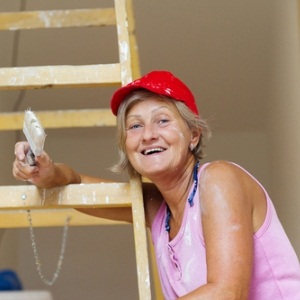
Women in their eighties who fell indoors, rather than outdoors or from a height like a ladder, died sooner than their peers, a new French study finds.
Indicator of frailty
Indoor falls could be an indicator of frailty and a sign that protective measures should be taken, say the authors.
The study was lead by Sebastien Bailly, a researcher with Hospices Civils de Lyon in France. He and his co-authors write in the journal Maturitas, "The mean survival time of women with inside falls was nearly 1.6 years shorter than that of women with other falling profiles."
Bailly and his colleagues studied 4,574 women who were over the age of 74 when they joined the study, could walk by themselves and were not living in institutional settings.
Read: Exercise improves older women's lives
The researchers called the women every four months for the first four years of the study to find out if they had fallen at some time during the previous week and where.
The study team distinguished among falls by their location, whether they were due to inattention or to an environmental obstacle, and how serious the resulting injuries were.
Fall categories
Along these lines, they classified the falls as environmental falls, such as slipping or tripping on something outdoors, falls from a height like a ladder or stairs, and inside or outside falls in general.
Looking at information on 329 women who had fallen the week before the phone call follow-ups, the researchers found that 26 percent were so-called environmental falls, 19 percent were outside falls, 43 percent were inside falls and 12 percent were falls from height.
The study team followed up again after another 13 years and found that 269 women had died. And those who had fallen indoors had an average survival time of 7.6 years, compared with 9.2 years for women who had any other type of fall.
Separate from the type of falls women had, the researchers also found that women with advanced age, signs of frailty, slow walking speeds and comorbidities – that is, other health conditions – also had shorter survival times.
Read: Extra pounds linked to weaker legs in older women
However, women with frailties, for example, "who experienced outside falls or falls from height had no increased mortality despite more serious injuries," the researchers note.
Unfavourable underlying conditions
"Among community-dwelling women, some fall more frequently than others," the study team concludes. "These women should draw the caregivers' attention because their falls may be indicators of frailty. Non-injurious falls are also of concern because women experiencing this type of fall may suffer from unfavourable underlying conditions and be at risk of short survival."
"The study is very well done," Dr. Kathleen Walsh told Reuters Health. "It has been shown in prior studies that for indoor falls the mortality tends to be worse, and longevity is diminished," said Walsh, who was not involved in the French research.
Walsh, a geriatric and emergency medicine specialist at the University of Wisconsin Hospital in Madison, said there are different reasons that people fall inside and one of the questions that would be have been interesting to ask was how much time the patients were spending indoors or outdoors.
"In general, people who fall inside have to stay inside for a reason and that's because of comorbidities – they're not super active and may not be active for different reasons," she said.
Read: Vitamin D may prevent fractures in older women
But, Walsh said, family members shouldn't panic and tell their elderly loved ones that they need to move into assisted living after they've had a fall.
Red flags
"Because if you panic without having things evaluated by the physician that person will probably not tell you again when they have fallen," she said. "Staying calm is the number one thing."
Walsh also said that physicians should ask their elderly patients if they have fallen within the previous year. If they have fallen, the doctors should find out what the patient remembers about the fall and if it was caused by certain movements, or if the patient could get up after the fall.
"The red flags are, did they pass out before they fell," she said. "It's all in the history, if you take a good history you can usually figure things out."
Walsh said that family members help to prevent falls by doing things like removing rugs and putting bars in bathrooms. In addition, she suggests elderly patients take classes to improve their balance and strength, such as the Stepping On class.
"Stepping is usually held at a local hospital or senior centre and it's all about things that you can do while you're washing dishes or doing odds and ends around the house so you don't have to go to the physical therapist," she said.
SOURCE: http://bit.ly/1oHXLKv Maturitas, online August 4, 2014.
Read more:
Preventing fall-related injuries in seniors
Brain protein key to 'senior moments'
Exercise has lasting benefits for older women
Image: Senior woman painting wall from Shutterstock




 Publications
Publications
 Partners
Partners










